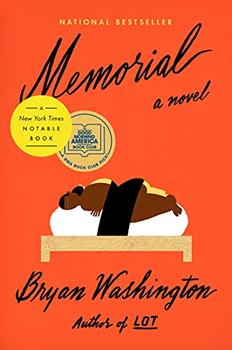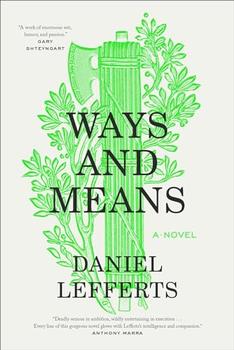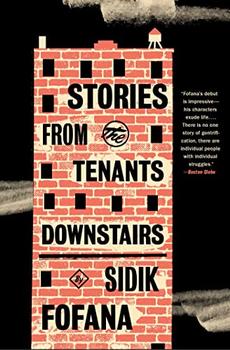Summary | Excerpt | Reviews | Beyond the book | Read-Alikes | Genres & Themes | Author Bio

Critics' Opinion:
Readers' Opinion:
First Published:
Oct 2020, 320 pages
Paperback:
Oct 2021, 384 pages
 Book Reviewed by:
Book Reviewed by:
Rebecca Foster
Buy This Book
After four years together, Benson and Mike are in a rut. "There's a point when you're with someone, and it's all just reaction. You've done everything there is to do," Benson observes. It's not just a matter of being bored; there are fundamental problems in their relationship, including domestic violence, cheating and a dearth of genuine communication. In a way, then, it's a relief when Mike hears that his estranged father, Eiju, is dying of cancer back in Japan. He decides to go take care of him until the end. Ironically, though, Mike's mother Mitsuko has just arrived for a stay in Houston, so she'll be Benson's responsibility.
They make an odd couple, this African American daycare teacher and the middle-aged Japanese woman he'd never met before who's now sleeping on his couch. Mitsuko is prickly to start with, but gradually she and Benson come to an understanding, thanks mostly to food. They shop for groceries together, and she teaches him how to cook. Both Mike and his father have worked as chefs, so initiating Benson into Japanese cuisine is Mitsuko's way of welcoming him into the family. Benson has a lot of other things on his mind, though: He's concerned about his alcoholic father, he's getting ready for his boss Ximena's wedding and he can't seem to stop flirting with the older brother of one of his daycare kids.
The narration is split between Benson and Mike, sticking with Benson's voice for the first third of the novel before switching to Mike for a long stretch set in Japan, then returning to Benson after he and Mike are back together in Texas. Their two voices are similarly matter-of-fact and understated. There are no quotation marks used to indicate dialogue (see Beyond the Book), so the characters' voices, thoughts and memories all blend together nicely. However, I found Mike's section too long, and Benson's style sometimes too flat ("The wedding reception is a wedding reception"; "It's whatever").
Behind these narrators' apparent lack of affect, though, is a quiet seam of emotion. Both young men are still shaken by their parents' separations, and haunted by patterns of abuse and addiction. Mike hasn't spoken to his father in the 16 years before going to Japan. Now, living with Eiju and managing his Osaka bar, he works to rebuild their bond even though he knows it can't last. Meanwhile, Benson has trouble trusting his family, who still pretend he isn't gay.
Brief flashbacks to how Benson and Mike met, and to key moments in their life together – discussions they've had about whether "okay" is good enough, the handful of times Benson remembers Mike saying "I love you" to him – create a tender backstory for a limping romance, leaving the way open for the characters to patch things up, despite the dalliances they've had while apart. The novel suggests that, whether the relationship survives or not, it has truly mattered. "It's not a waste, is what I'm saying. There are no wastes," Mitsuko encourages Benson before she leaves Houston.
Although the novel's title (like most of the chapter titles in Washington's first book, the short story collection Lot, which won the Dylan Thomas Prize and a Lambda Literary Award) refers to a Houston neighborhood, it also has broader significance. It invites readers to think about the place our loved ones have in our memories, whether they are living or not. A memorial can be physical, as when Mike takes Eiju to a Shinto shrine to make an offering and ring bells; it can also be a mental landmark, like the strange yet rewarding time that Benson spends with Mitsuko. As Mike puts it, "we take our memories wherever we go, and what's left are the ones that stick around, and that's how we make a life."
Washington is not a very visual writer — you wouldn't pick up Memorial for a mental picture of Osaka or a virtual tour of Houston — but his love for his hometown is clear. He portrays Houston as a vibrant, multicultural city. Its settings feel fresh and inviting. There is a heavy Latin influence in the featured area, along with women in hijabs and Asian foods at the supermarket. Notably, none of the book's major characters are white. This makes it contemporary and relevant — part of a necessary corrective to the preponderance of white, straight stories in literature and elsewhere.
Washington excels at exploring the dynamics and psychology of relationships, showing what happens when you throw two hostile characters together, or put two very different families in a room, or have two guys who share a lover meet for the first time. I was especially struck by Benson and Mike's complicated feelings for their fathers. Despite the tough issues the characters face, their story is warm-hearted rather than grim. Memorial is a candid, bittersweet work from a talented young writer whose career I will follow with interest.
![]() This review was originally published in The BookBrowse Review in November 2020, and has been updated for the
November 2021 edition.
Click here to go to this issue.
This review was originally published in The BookBrowse Review in November 2020, and has been updated for the
November 2021 edition.
Click here to go to this issue.

If you liked Memorial, try these:

by Daniel Lefferts
Published 2024
A searing debut novel about a striving finance student, the line between ambition and greed, and the disordered politics of our era.

Stories from the Tenants Downstairs
by Sidik Fofana
Published 2023
Set in a Harlem high rise, a stunning debut about a tight-knit cast of characters grappling with their own personal challenges while the forces of gentrification threaten to upend life as they know it.





The Flower Sisters
by Michelle Collins Anderson
From the new Fannie Flagg of the Ozarks, a richly-woven story of family, forgiveness, and reinvention.

The House on Biscayne Bay
by Chanel Cleeton
As death stalks a gothic mansion in Miami, the lives of two women intertwine as the past and present collide.

The Funeral Cryer by Wenyan Lu
Debut novelist Wenyan Lu brings us this witty yet profound story about one woman's midlife reawakening in contemporary rural China.
Your guide toexceptional books
BookBrowse seeks out and recommends the best in contemporary fiction and nonfiction—books that not only engage and entertain but also deepen our understanding of ourselves and the world around us.